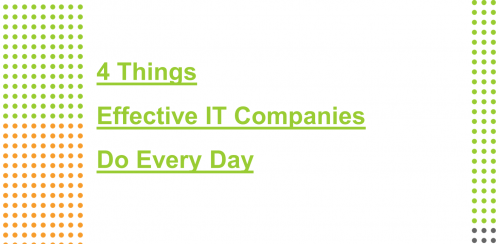Good IT companies do tech support. For great companies, tech support is just the beginning.
Because really, tech support is the bare minimum. IT companies (managed service providers) provide incredible value — if you know what to look for…

– Explore 4 roles: Resource, Guide, Facilitator and Guardian – Understanding the 5 types of IT providers – Advice on comparing managed service providers – How to tell if an IT company knows its stuff |
4 Things Effective IT Companies Do For Clients
- They act as a Resource
- They serve as a Guide
- They work as a Facilitator
- They are a Guardian
As a managed service provider, these 4 things — roles, if you will — are critical to the clients’ best interests. IT can’t perform in a vacuum. Your IT company can’t either.
Let’s take a closer look at each role.
But, first: What’s the difference between a break/fix and a managed service provider?
A break/fix can only handle small issues after they happen. Here’s what businesses risk with a break/fix:
- They’re reactive: when things break, people are left waiting for it to be fixed. This leads to a loss of productivity and waste of working hours.
- They don’t fix problems at the source: by resolving the symptom and not the source, the issue can occur again and again, wasting your time and money repeatedly.
- They aren’t client-centric: break/fix companies rely on tech issues to make a profit. As a result, they may not be putting as much care into fixing your problems completely.
iVenture is a managed service provider (MSP). This means we provide comprehensive IT services, from support to cybersecurity to cloud and more.
The right managed service provider will improve your business now and into the future.

Managed service provider A managed service provider (MSP) provides end-to-end IT services. With an MSP partner, your entire IT environment is handled from one trusted resource. |
IT Companies Are A Resource
IT isn’t the easiest thing to understand. That’s why IT companies need to be a constant resource. Businesses shouldn’t be expected to know what a VPN is or why redundancy is important. Good IT companies answer questions, present options and keep up with industry trends.
Key point: Make sure your IT company has specialist employees. Roles like systems engineers, technical account managers and help desk technicians. This signifies a mature service operation.
There are 4 signs of a mature service operation:
- An established ITIL service delivery process
- The MSP is able to provide IT that aligns with business needs
- Strong change management processes (plan, test, deploy, QC)
- The MSP has a tested method of handling changes to operations
- Well-defined user support roles (help desk, desktop support)
- The MSP employees have specific responsibilities that don’t deviate
- Well-documented networks & support knowledge
- The MSP records technical and customer service processes diligently
IT Companies Are A Guide
Not only do effective IT companies fix immediate problems, they advise future goals.
Take this example.
John & John Law has 2 servers on site to store files. The servers are old, slow and unreliable. So John & John asks their IT company to install new ones.
While the IT company can certainly set that up, there’s a deeper question to ask — has John & John considered cloud hosting? It’s safer, quicker, more reliable and accessible from anywhere.
John & John hadn’t even considered this option.
Effective IT companies excel with this guidance. It’s our job to have a long view of business goals so you’re set up for success.
Our team calls these “client roadmaps”. Roadmaps help business owners plan budgets and set goal checkpoints. They remove guesswork from IT planning.
IT Companies Are A Facilitator
Think about the different IT tools you use. Microsoft software, Dell computers, Citrix, SonicWalll, Cisco, the list goes on! Way too many vendors to deal with alone. That’s why good IT companies act as a Facilitator.
They work with you to select and purchase the right technology. More than that, they handle vendor communication as part of your service level agreement (SLA).
What you should look for is a managed service provider that has key partnerships with big name vendors. Ask about the following partnerships:
- Microsoft Gold Partner
- Microsoft Cloud Solutions Provider
- Cisco/Meraki Systems Partner
- SonicWALL Gold Partner
- VMware
- Dell Service Partner
- HP Enterprise Partner
The answer will tell you if the IT company is the real deal. These partnerships have strict standards to meet and keep. It takes a high-quality MSP to handle the work.

Service-level Agreement (SLA) SLAs are business contracts between IT service providers and clients. They have three purposes:
|
IT Companies Are A Guardian
Perhaps the most important role of a managed service provider is to protect. And this is a 24/7/365 responsibility. Good IT companies have systems to keep business safe.
It all comes down to business continuity. What would happen if all your files were gone? Would your business survive?
What do effective MSPs do to prevent data loss from:
- Natural disasters (fires, floods, hurricanes, tornadoes)
- Targeted attacks (malware, spyware, physical theft or destruction)
- Human error (deleting files, breaking computers, losing passwords)
It takes a 360° cybersecurity strategy to monitor, prevent and solve problems like these.
Take this real-life cautionary tale of a business without the right cybersecurity.
Effective IT companies have virus and spam protection (for desktop and servers!) as part of the service level agreement.
But it’s more than that.
Here’s what you should look for and compare between managed service providers:
- Regular patches for security bugs
- Firewall management
- Two-factor authentication and management
- Event monitoring/management
- Partnership with cybersecurity experts
- Compliance with CMMC, HIPAA, NIST, SOC, ISO, etc.
- Cloud infrastructure/cloud services (AWS, Azure, private)
Here’s the link to our public cloud and private cloud details.
Remember, tech support is the bare minimum. Being a Resource, Guide, Facilitator and Guardian for clients every day is the mark of a great IT company.
If you’re looking to level up, give us a call. Let’s talk about your IT needs.






